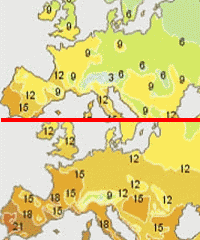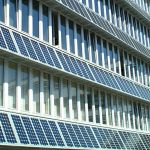|
|
 |
|
|
|
 |
 |
People changing climate
Climate change may be due to natural processes or due to human influence. In any case it is a problem with unique characteristics. It is global, long-term (up to several centuries) and involves complex interactions between climatic, environmental, economic, political, institutional, social and technological processes. The consequences are international and intergenerational. Moreover a forecast of changes is subject to uncertainties and the necessary decision-making underlies strong risks. The further development can hardly be predicted or extrapolated from observed trends, since climate change can be non-linear and may also include irreversible changes.
|
 |
 |
 |
|
Encyclopaedia link to People changing climate
|
|
Sustainable development
These are the challenges for any sort of strategy which tries to cope with the problem of climate change. The solution can only be both, a sustainable development using energy and material resources which can be recycled within a few years or decades and reducing energy intensive personal consumption.
|
 |
 |
|
Ways to a sustainable developement: Reducing personal consumption - keeping transportation ways short - investigation, development, testing and application of new energy techniques like hydrogen engines - exploitation of already available techniques like wind energy and biofuel - storage and reduction of CO2 emissions - emission trading ...
|
|
| Sustainable development is development that meets the needs of the current generations without compromising the ability of future generations to meet their own needs. | |
|
 |
 |
|
1. Medium scenario of the world's population developement. For calculations and details, please check the website of the  United Nations Population Division United Nations Population Division
Please click to enlarge! (45 K)
|
|
 |
Are we changing our climate?
After intensive research on the field of climate science, the answer becomes more and more clear. In its Third Assessment Report TAR 2001 the Intergovernmental Panel on Climate Change (IPCC), which is made up of experts from around the world, concluded: It is virtually certain that human-made emissions of greenhouse gases had contributed significantly to the observed climate change over the last 30 to 50 year.
|
Our emissions are increasing, the world's population is increasing, the consumption per person of most of us is increasing. So far the optimisation of existing combustion processes and the application of renewable energy technologies could not counteract this trend. Climate change will amplify in the next decades.
Scenarios - Can we predict the future?
Scenarios are no predictions. Predictions are hardly possible. For us it is as difficult to predict the technical and economic development until 2100 as it was for somebody in 1900 to predict it until 2000. Think about what happened during the last 100 years!
Therefore mitigation strategies have to take into account the consequences of a wide range of possible scenarios. Such scenarios have to take into account several key factors:
|
 |
 |
 |
|
2. The upper map shows average yearly temperatures for the time span 1961-1990, the map below the projection for the time span 2071-2100. - Source: Sweclim / Naturvardsverket
|
|
Population growth: Most models expect a growth of global population which peaks in midcentury and declines thereafter.
Technologies: The introduction of new and more efficient technologies can be slower or faster.
Energy: Scenarios generally expect, that more energy is needed, but it may be fossil intensive or come from non-fossil energy sources.
Economic development: The economy can either develop in a regionally orientated way with more local efforts on sustainability or cultural and social interactions could develop world wide leading to a more efficient capacity building.
|
What do we emit? What will we emit?
The biggest probem are greenhouse gas emissions.
The challenge of climate change mitigation from an equity perspective is to ensure that neither the impact of climate change nor that of mitigation policies exacerbates existing inequities both within and across nations.
One consequence of this is, that the developed countries have to reduce greenhouse gas emissions first.
Example:
In 1996 aggregate global emissions were about 6 GtC (22 Gt CO2), i.e. 1t carbon per capita. 1.2 billion people living in developed countries emitted 3.8 GtC (64%), i.e. 3t/capita. 4.4 billion people in developing / third-world countries emitted 2.1 GtC, i.e. 0.5t/capita.
|
 |
 |
 |
|
3. IPCC: Resources and Emission Scenarios
 Fig. TS 5 Fig. TS 5
The diagramm shows in three parts [Gigatons of pure carbon]:
a) the resources of fossil fuel and the use from 1860 to 1998
b) the expected scenarios of total fossil fuel consumption until 2100 without any mitigations measures (SRES scenarios)
c) the mitigation scenarios until 2100 aiming at a stabilisation of greenhouse gas emissions at different stabilisation levels.
The variances are due to different assumptions in the emission factors described above
Please click to enlarge! (50 K)
|
|
|
The present CO2 mixing ratio in the air is about 370 ppm (compared to 280 ppm before industrialisation). If the emissions go on to increase, which is actually the case, the reductions in the future have to be more and more drastic or the a goal of the envisioned lower case scenario of 450 ppm in 2100 will be unachievable within 3-4 decades. If CO2 reaches 560 ppm, which is much more likely (CO2 doubling scenario), a global warming of 1.5-4.5°C is predicted. 4.5°C is the difference between the average temperature in London (or Cologne) and Madrid.
At present the average US American emits about 20 t CO2 per year, the average West European about 10 t CO2 per year, the average Chinese 3 tons and the average Indian little more than 1 ton. 1-2 tons per person would be the maximum, if CO2 in the air shall stop increasing. 2 tons is roughly the amount for a return flight from Europe to New Zealand, or driving a big car consuming gazoline 10,000 km per year.
|
 |
 |
What can be done?
Decoupling of growth from resource flow:
- Eco-intelligent production systems should allow a sort of consumption leading to less waste, less transport, higher durability.
- A loop-economy feeds back materials in the production cycle, minimises the resource content, uses biodegradable materials. |
 | | Infrastructure optimisation:
In developing countries mistakes of the developed countries could be avoided, experiences be used: efficient rail systems, regionalised food and energy productions with short ways to the user. |  | | Energy systems have to change:
Fossil-fuel energy must be optimised and be replaced stepwise and as soon as possible by renewable energies, end-use efficiency has to grow. Example: 76% on Africa's population relies on wood as basic fuel material, while solar energy especially in the Sahel could be made available. Certainly investments would be necessary. |  | | Decoupling wellbeing from production:
Quality of life and satisfaction are not necessarily coupled to higher energy and resource demands. Quality of life could concentrate more on often neglected issues as participation in community, fostering sustainable development, benefiting from regional nature, improvements of social justice. |  | | Mainstream opinions as 'more consumption leads to more satisfaction' or 'higher speed in transportation is a progress' are questionable and probably lead neither to more sustainability nor to more personal happiness, in particular in developed countries where a certain standard of living is already achieved. We as single citizens should more regard social and ecological intelligence as a progress than exploitation of resources and accumulation of goods. |
|
The topic PEOPLE CHANGING CLIMATE gives an overview of indications for human induced climate change, estimations for the future and potential measures, to cope with the arising problems.
About this page:
author: Dr. Elmar Uherek - MPI for chemistry, Mainz
last published: 2004-06-11
|
|
 |
|









